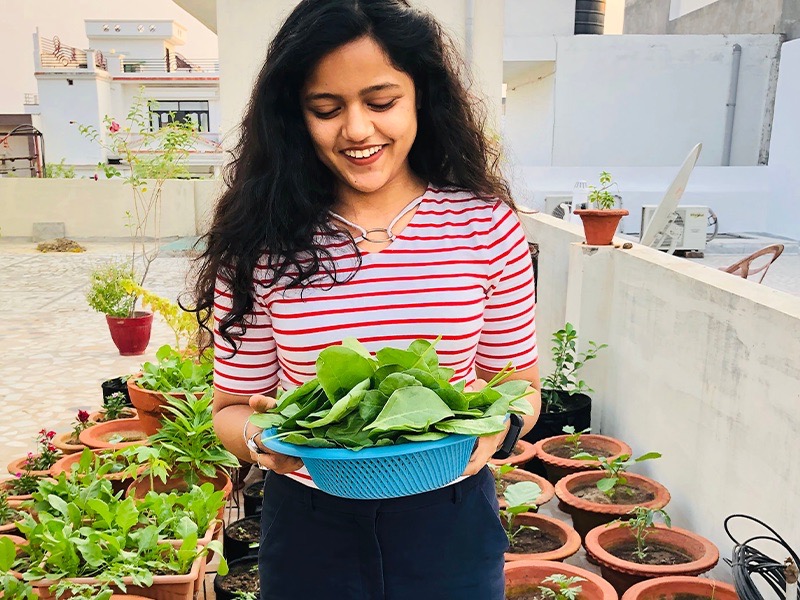The 500-odd farmers of Gurha Kumawatan, a village in arid Rajasthan, are now millionaires thanks to polyhouse farming. Their hard work, innovation and unlimited ambition offers a path to prosperity for others in India.
Anushka Jaiswal, a 28-year-old farmer from Lucknow, is inspiring others in the region with her innovative precision farming techniques. Discover her journey from an economics graduate to a trailblazing farmer, empowering women and inspiring sustainable practices.
 Sanjana James
Sanjana James 
When Anushka Jaiswal, 28, was the president of the placement cell during her final year at Delhi’s prestigious Hindu College, she helped nearly all her classmates land jobs. Yet, she wasn’t keen on following suit herself.
Call it clarity of mind or youthful certitude, Anushka was pretty sure what she didn’t want. The monotony of sitting behind a desk, confined to a traditional workplace, topped her list.
Upon returning to Lucknow after graduation, still uncertain about her career path, she found herself captivated by her mother’s terrace garden. On a small rooftop, her mother had managed to grow a variety of vegetables—tomatoes, gourds, and more.
“I realized I really enjoyed this work and would never get bored of it. That’s when the idea struck me to turn my hobby into a profession,” she recalls.
Embracing innovation
Anushka’s family had a history of farming, which sparked her desire to arm herself with modern, scientific knowledge. She enrolled at the Institute of Horticulture Technology in Greater Noida, where she learned about hydroponics and protected cultivation. These techniques offer a sustainable and profitable alternative to traditional agriculture.

Protected cultivation involves creating a controlled farming environment. A semi-cylindrical indoor structure called a polyhouse is built using iron grids and translucent plastic sheets. Polyhouses regulate temperature and humidity, ensuring better land efficiency and water savings via drip irrigation. The technique eliminates weather risks and allows for year-round vegetable production.
Hydroponics, by contrast, removes soil from the equation, using mediums like coco peat or chips instead.
“Traditional farming isn’t the future,” Anushka asserts. Thanks to protected cultivation, her farm now yields up to 30 tons of seedless cucumbers and bell peppers per acre, compared to the 4-6 tons produced by traditional methods. This approach conserves resources—water, quality soil, fertilizers, and pesticides—while addressing climate challenges and contributing to global food security.
Overcoming challenges
Anushka’s path hasn’t been without obstacles. Lacking ancestral land and struggling to secure investment, she encountered significant barriers. Gender stereotypes added another layer of difficulty. Family and friends she approached for loans questioned whether marriage would pull her away from the business. But Anushka’s determination set her apart. “This is my bread and butter. I’m not leaving it behind,” she says.

Polyhouse farming is an expensive venture, with costs reaching up to Rs 50 lakh for one acre of structure. However, governments offer loans and subsidies covering up to 80% of costs. The high yields typically allow farmers to recover their investment within a year.
Anushka started in 2020, cultivating cucumber on a small piece of leased land. The first harvest, just three months later, was promising—but the pandemic meant prices were lower than expected. However, as conditions improved later that year, she earned over ₹20 lakh from just one acre. To put it in perspective, an average Indian farmer cultivating traditional crops like wheat or paddy on one acre typically earns only ₹1 lakh. Today, her operations span six acres with an annual turnover of ₹80 lakh.
Empowering women in agriculture
Anushka employs 25 women farmers, emphasizing their unique ability to handle delicate plants with care. “Women are more tender with plants and monitor them closely for issues,” she explains. This inclusive approach not only boosts productivity but also empowers women in an industry where they are often underrepresented.
Building trust with her workers and investors wasn’t easy, but Anushka’s results speak for themselves. Shahzade Ali, Anushka’s manager, recalls, “I used to wear ragged clothes, toil under the sun, and barely save anything as a traditional farmer. After joining Anushka didi’s farm, my lifestyle and financial circumstances have drastically improved.” He gestures toward his new bright orange jacket and muffler, a symbol of his newfound stability.
The role of government and the path ahead
While subsidies and programs under the Mission for Integrated Development of Horticulture (MIDH) have supported Anushka’s efforts, she stresses the need for more responsive policies. “Government subsidies are based on outdated rates, which don’t account for rising costs,” she says. Anushka advocates for better farmer training and resources to make sustainable farming methods, like protected cultivation, accessible to all.
Inspiring a community
Anushka’s work has inspired traditional farmers in her region to consider adopting sustainable methods. “You cannot grow alone,” she says, emphasizing the importance of mutual growth. “My investors, workers, and village are all growing with me.”
Her journey is a testament to what determination and innovation can achieve, even in the face of societal expectations and logistical hurdles. Anushka Jaiswal is not just growing crops—she’s cultivating a brighter, more sustainable future for Indian farming.
The 500-odd farmers of Gurha Kumawatan, a village in arid Rajasthan, are now millionaires thanks to polyhouse farming. Their hard work, innovation and unlimited ambition offers a path to prosperity for others in India.